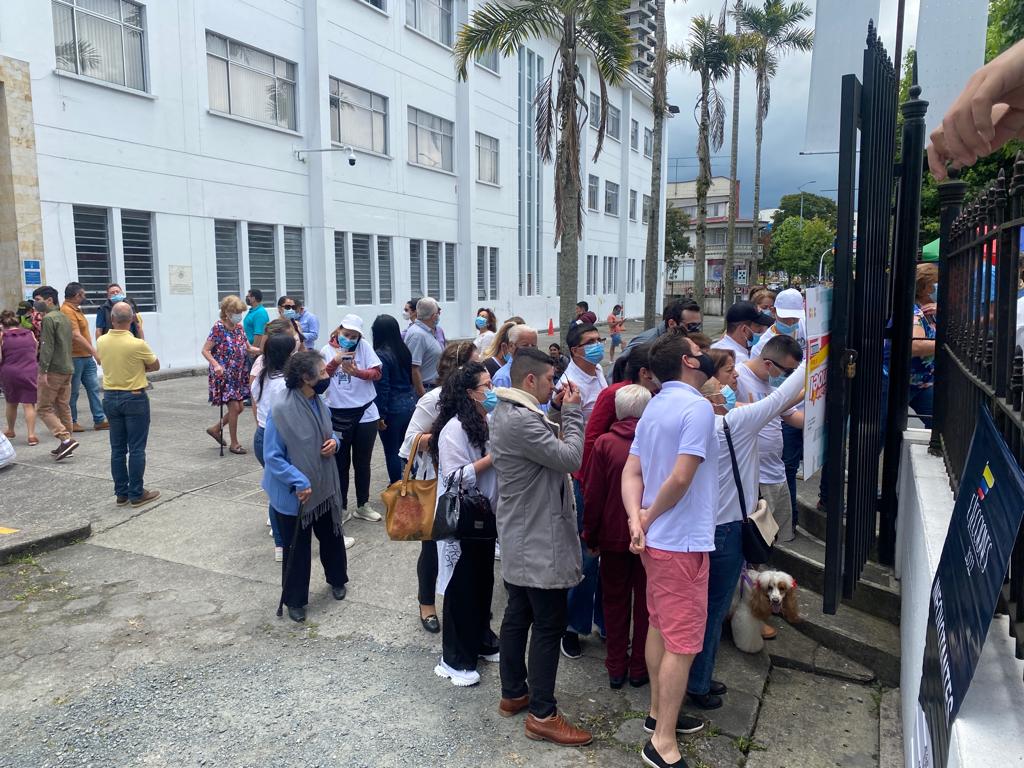RIO DE JANEIRO, BRAZIL – Tensions in Colombia’s elections began to ease Tuesday after most political parties expressed confidence in the vote count for the Senate and the national registrar, Alexander Vega, backed away from his proposal Monday to recount the votes in the face of doubts.
The majority of parties chose to accept the recount, which gave the left nearly 400,000 more votes than had originally been announced on March 13, the day of the general election, which served to quell the protests of those who spoke of “fraud” or even a “coup d’état.”
All this happened Tuesday at the meeting of the National Commission for the Coordination and Supervision of Elections, which was attended by 19 political movements, the Chancellery and the National Electoral Council, the organizers of the elections, as well as the national government, control bodies, and election observers.

The leftist presidential candidate Gustavo Petro, who had asserted that the “recount without transparency is fraud” and for that reason had decided to suspend his participation in the debates, celebrated today, after learning of Vega’s decision not to propose the recount, the return “to democratic institutionality in the electoral review.”
Among the 16 parties that have accepted the recount in its current form are movements from all camps, such as the right-wing Partido de la U and Cambio Radical, as well as the left-wing Polo Democrático Alternativo (PDA) and Colombia Humana.
There is no consensus, however, and the flame could be rekindled at any moment, as four movements insist on demanding a recount of the votes: the Democratic Center led by former President Álvaro Uribe, the Green Oxygen of presidential candidate Ingrid Betancourt, the right-wing National Redemption Movement and the Conservative Party.
However, Chancellor Vega defended the audit, stressing that “the request I made yesterday was to present it today, and I did not make a request.”
“This was done with the aim of finding a way out of the whole issue of legitimizing this result because they said there was fraud and there never was fraud,” he said.
TENSE DAYS
The controversy began the day after the March 13 elections, when the Petro-led leftist Historical Pact coalition claimed that nearly 500,000 votes for the Senate had not been counted.
The 97% count released Friday by the Registraduría showed 390,152 more votes than the 2,302,847 reported in the preliminary count, giving him a total of 2,692,999 votes.
Amid the confusion, former presidents Andrés Pastrana (1998-2002) and Uribe (2002-2010) alleged fraud “in favor of the (Historic) Pact” and refused to recognize the elections, a serious matter given that Colombians will go to the polls again on May 29 to elect a president.
“President Iván Duque: the legitimacy of the electoral process and your own legitimacy are in question (…) Please act now. Guaranteeing democracy is your first duty,” Pastrana wrote on Twitter today.
PASTRANA AND URIBISMO’S CONCERNS
It was Pastrana who first questioned the elections after Petro met last February in Madrid with representatives of the Spanish multinational Indra, which supplies the vote-counting platform for which he is calling for a “forensic analysis of the software” to ensure the reliability of the electoral process.
For its part, the Democratic Center disagreed with the chancellor’s decision not to propose a recount of the Senate elections.
“The registrar is giving up his request for a recount, and the leftist parties are thanking him and applauding him. The point is that we all have confidence in the electoral system. Today, many of us don’t know that,” Senator Paloma Valencia wrote on Twitter.
During his speech at the commission, Vega said that those interested in having their vote recounted can submit a request to that effect to the National Electoral Council (CNE), which will make the decision, but stressed that his office will no longer do so.
Although the biggest discrepancies occurred in the Senate vote, there are also discrepancies in the House vote, which the Registraduría is expected to publish this week, Vega said.
VICE PRESIDENTIAL CANDIDATES
On the other hand, Petro postponed the announcement of his running mate until Wednesday. It is expected to be social leader Francia Márquez, who received nearly 800,000 votes in the presidential election of the Historical Pact.
Federico “Fico” Gutiérrez, the right-wing candidate, has not yet commented on who will accompany him on the ballot, nor has he shown any signs that would allow speculation about it, although this issue should be resolved by the end of the week.

